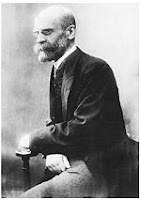
You could make the argument that you won't find too many Sociologists who are not liberal politically. After all, we tend to have more of a scientific view of the workings of society understanding that life is much more than it seems on the surface, hence the need for an open mind. However, when I think of Structural-functionalism, the oldest theoretical approach in Sociological pedagogy, I envision the root of conservativism in the works of those like Durkheim, Spencer, Comte, and Parsons, etc. At the beginning of grad school I remember being told Functionalism obselete due to the proliferation of theories like Feminism and Systems. But I believe Functionalism to be alive and well--at least in terms of how I teach it.
I compare functionalism to political conservativism, e.g. ideas similar to: a family consists of a father, mother, and children--anything else is a dysfunctional operation; poverty must exist to continue the functional operation of a capitalistic society--an increase of consumption of goods and services increases supply and demand, thus making the small portion of the rich, richer. After all, it was Functionalism that fueled Sociology as a discipline, making it completely FUNCTIONAL for Durkheim during a time of unrest and political turmoil in the late 1800's Europe--by his yielding to the political powers of the day. Durkheim was able to further the case for Sociology, the scientific study of human society, by identifying and explaining social facts in society rather than criticizing them.
However, where I think the notion of "obselete" comes in is-- because Sociology has grown as a discipline in such that it has allowed us to see the intricacies of society, we can recognize functionalism for its tendency to be much too simplistic in its explication of people and their doings...much like political conservativism. Coming full circle, then, both are viable in terms of belief systems of how things USED to function, but can no longer. The best analogy is this: You've lost your leg in a terrible accident. Instead of consternating about the loss, and memoralizing how your body should function, you need to get a prostethic and carry on with your life. This is how I would explain the importance of Structural-functionalism. And here is the rest of it.

1 comment:
Well, this sociologist is a politically conservative one. What few sociologists understand is that studying society is one thing but that it is important to know the difference between study and being a part of society. I doubt that few sociologists have ever actually read a great many American political documents and therefore do not grasp why that being politically conservative is more logical than otherwise. Besides, we would all do well to study Durkheim more anyhow.
Post a Comment